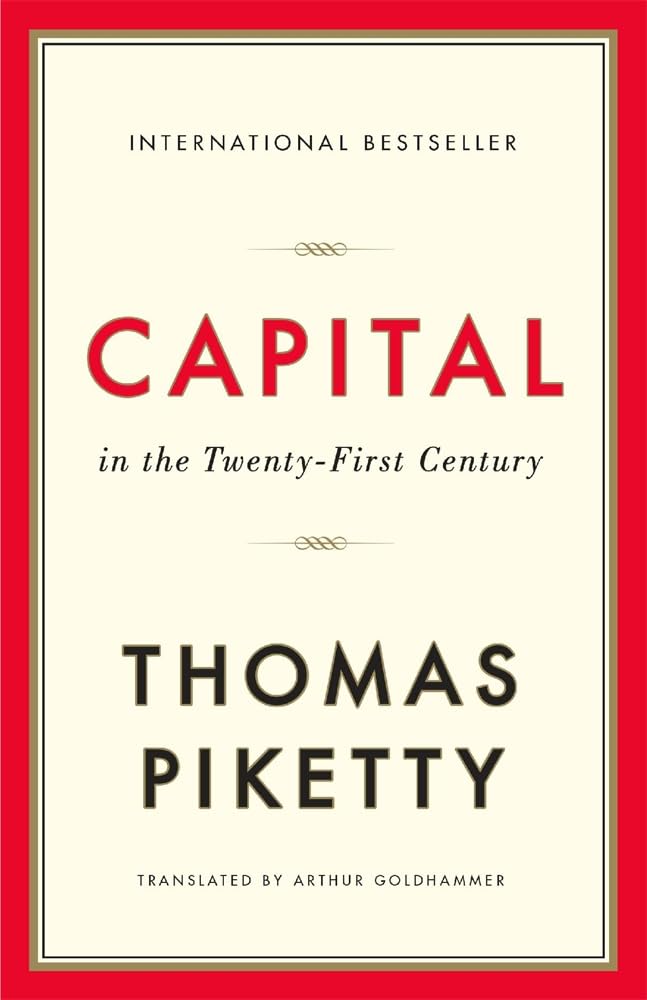Customer Services
Copyright © 2025 Desertcart Holdings Limited
Desert Online General Trading LLC
Dubai, United Arab Emirates


Full description not available






A**W
A Gold Mine
This is a tremendous book! It is a great start to understanding the current state of our global economy. The central argument being for the global taxation of wealth to restore a world that is becoming less egalitarian by each decade. Piketty uses two equations, known as "The Fundamental Laws of Capitalism," and a girth of historical data to arrive at his point.The equations are:a = r * B where r = rate of return; B = the capital/income ratio; a = the share of income from capital in the economyandB = s/g where B = the capital/income ratio; s = the savings rate; g = growth rate of the economyThese two laws are inter-related. Equation 2, states that the lower the growth of the economy, the more power is exerted by inherited capital because via equation 1, it will generate a larger share of income in the economy. Growth in world output up until the 17th century was nonexistent. Therefore, throughout much of human history there were very rigid social class structures that prevented people from accumulating wealth over their life and in due process passing on a better life to their children. Piketty cites Jane Austen novels here as evidence that the central characters of her novel thought it more worthwhile to marry into wealth than to work for it, for no matter how hard one worked or in what sort of profession, it was impossible to generate the type of lifestyle the wealthy enjoyed.The entire dynamic of wealth changed during 19th century at the advent of the industrial revolution. Suddenly, growth in world output went up to 1.5%. Society was more dynamic. Social class was more fluid. However, the structural forces that breed inequality in society did not change, for the nature of capital did not change. According to the author, over the long run, the capital/income ratio will continue to increase because capital can be reinvested and over time will generate a higher return than income.On the eve of WWI, the value of capital/income in Europe and America was a hair under 7. This was the marking of a rare point in history. For the brief 30-year period of war and instability that followed, the value of capital did not increase faster than that of income. On the contrary, it shrank relative to income. It is as if an external shock restored a social equilibrium. The capital/income ratio reached a low point of a hair over 2 in the early 1950s. The baby boomers that followed were born into what might be considered the most equal society in the history of civilization. They were given a rare opportunity to truly live the “American Dream” and (now me talking) believe that they are entitled to everything they earned.Unfortunately, their kids were not born into a similar opportunity. The capital/income ratio has steadily crept up since the 1950s and now stands at around 5.5 in Europe and 4.5 in the U.S. These statistics mask some of the already inegalitarian societies like Italy where the ratio is closer to 7. What is further the problem is that world output, which grew on average of 3% in the 20th century, is falling. The author does not believe that this trend will reverse because historically, about half of growth in world output is generated by the growth in population and the other half through actual progress in technology and productivity. With demographics set to shrink in the coming decades, it seems unlikely that we will be able to sustain the 3% growth in world output in the future.Thomas Piketty’s solution is a global tax on capital. To purge society from systemic convergence toward inequality, you must eliminate the upper hand that capital affords to the beneficiaries of inherited wealth. I completely buy his argument here. The wealthy do have access to better wealth managers and investment vehicles that ordinary people like myself just do not. Ultimately however, what truly matters, and what is truly difficult to analyze, is whether society would be better off with such a tax. As the author states himself, half of the people in our country have zero savings. This relative proportion has been uniform throughout history. However, these same people today can live, materially speaking, much richer lives than the wealthy predecessors discussed in Jane Austen novels. The purchasing power parity has increased like seven-fold over the last few centuries, this all thanks to in great deal to the innovation and efficient allocation of resources over the past few years.Perhaps this picture would have been different with a global tax on capital. It would have been interesting to see what Piketty’s thoughts would be on how this sort of tax would affect entrepreneurship, if the risk taker knew that as soon as they sold their business they would be met with a yearly tax on their wealth. I think the bigger question that is left unanswered in the book is who would ultimately receive the proceeds from such a tax and for what purpose would it be used? Would society be truly better off if the government could tax capital and spend more as opposed to the vast amount of institutional funds and PE shops which for the most part allocate capital on the behalf of the wealthy?Regardless of whether you agree with the politics of the book, you should read it, if not for the data alone. The author poses a serious question in this book and provides a well thought out solutions. I might not be completely convinced of his thesis just yet, but I am much more knowledgeable about the the nature of capital/income split. This was a great and sobering starting point. Cheers!
J**G
I'm an engineer, not an economist. Read this book for a better understanding of your world.
Thomas Piketty's book, "Capital in the Twenty First Century," has been resoundingly endorsed by Nobel Prize winning economist Paul Krugman. Since the reactionaries were freaking out, I couldn't resist reading it and finding out for myself what the hoopla was all about. The reason for the reactionary freak out is explained below.Anyone who has bothered to read this book must admit that the writer is rigorous in his analyses and my impression was the writer eschews prejudgment. Piketty provides exhaustive data throughout in a fascinating historical analysis of capital and the inevitable pitfalls of indecent inequality of wealth ("...the `first globalization of finance and trade (1870-1914) is in many ways similar to the `second globalization' which has been underway since the 1970's." and, "...capitalism automatically generates arbitrary and unsustainable inequalities that radically undermine the meritocratic values on which democratic societies are based.") There were reasons for the financial shocks and the world wars of the 20th century, and if we're not paying attention...Piketty notes that, "Economists are all too often preoccupied with petty mathematical problems of interest only to themselves." Nevertheless, the essential economic equations and trend analyses are sufficiently addressed and easily understandable by all. He notes that economics should be considered a branch of social science, i.e., "...politics is ubiquitous and...economic and political changes are inextricably intertwined and must be studies together."If nothing else, the reader is warned, "...all citizens should take a serious interest in money, its measurement, the facts surrounding it, and its history. Those who have a lot of it [money] never fail to defend their interests. Refusing to deal with numbers rarely serves the interests of the least well-off."So why are reactionaries freaking out over this book? Piketty concludes that national debt can only be reduced by: repudiation (bad), inflation (horrible), austerity (really horrible), or a progressive tax on capital (reasonable). Further, he recommends that the only reasonable way to address indecent wealth inequality is a progressive global tax on wealth, which in turn requires global transparency of accounts and an end to foreign tax havens; he goes on to say none of these measures will be easy, but does offer practical suggestions. Clearly, the plutocrats would panic over popularization of such a suggestion, and it only takes a word or two from them to spin up their PACs and puppet organizations (I won't name names) into blindly trashing these rational suggestions. Thus the one-star reviews from those who haven't read the book.Other specifics of note:* His rational explanation of what central banks do and why they are necessary is excellent and should be understood by all.* His discussion of past and recent European economic issues, the creation the Euro, and administration by the ECB and European Committee should be of great interest to most Americans.* The fact that income taxes were not invented by Woodrow Wilson and had been used successfully in Europe for many decades before that is probably news to most Americans.* The real reasons why the gold standard had to be abandoned and is no longer feasible should be better understood by many.* His explanation of what "rentiers" are (i.e. those with sufficient wealth to live off dividends, rents, and other financial instruments) is something that should be better understood by all. At some point, wealth takes on a life of it's own whenever r>g and this and what amounts to regressive taxation at the top of the pyramid, are the driving force behind income inequality.* His explanation of the recent phenomenon of "super managers" who demand salaries in the tens of millions (the ones that piss everyone off), and how it was a result of the conservative revolution of the 1980s' is something that should be understood by all.Though it's a tough slog for me, but I highly recommend this book be read be all. I recommend someone write a "Reader's Digest" version that could reference the original, since the average reader may struggle with it.
Trustpilot
5 days ago
3 weeks ago